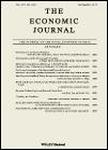-
作者:Mendoza, Ronald U.
作者单位:Asian Institute of Management
摘要:This article develops a model of trade-induced learning whereby both domestic and cross-border learning externalities could drive long-run growth. This framework is used to synthesise the emerging empirical evidence, revealing how trade-induced learning could underpin the mechanics behind trade and growth in at least three important ways: first, trading matters, as firms might be able to increase their productivity due to export and import linkages with buyers and suppliers; second, whom you t...
-
作者:Bettinger, Eric; Kremer, Michael; Saavedra, Juan E.
作者单位:Stanford University; Harvard University; National Bureau of Economic Research
摘要:It is unclear if vouchers increase educational productivity or are purely redistributive, benefiting recipients by giving them access to more desirable peers at others' expense. To examine this, we study an educational voucher programme in Colombia which allocated vouchers by lottery. Among voucher applicants to vocational schools, lottery winners were less likely to attend academic secondary schools and thus had peers with less desirable observable characteristics. Despite this, lottery winne...
-
作者:West, Martin R.; Woessmann, Ludger
作者单位:Harvard University; University of Munich
摘要:Nineteenth-century Catholic doctrine strongly opposed state schooling. We show that countries with larger shares of Catholics in 1900 (but without a Catholic state religion) tend to have larger shares of privately operated schools even today. We use this historical pattern as a natural experiment to estimate the causal effect of contemporary private competition on student achievement in cross-country student-level analyses. Our results show that larger shares of privately operated schools lead...
-
作者:Dustmann, Christian; Machin, Stephen; Schoenberg, Uta
作者单位:University of London; University College London
摘要:This article documents that at the start of school, pupils from most ethnic groups substantially lag behind White British pupils. However, these gaps decline for all groups throughout compulsory schooling. Language is the single most important factor why ethnic minority pupils improve relative to White British pupils. Poverty, in contrast, does not contribute to the catch-up. Our results also suggest the possibility that the greater than average progress of ethnic minority pupils in schools wi...


